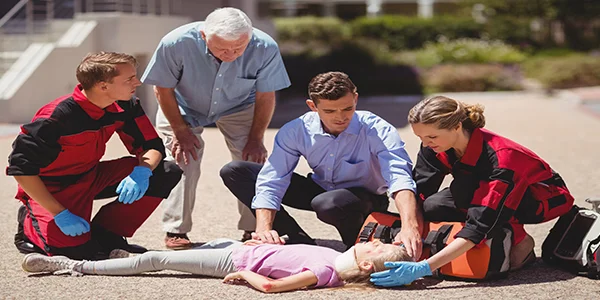Understanding Syncope: is a medical term that refers to a temporary loss of consciousness and muscle strength caused by a sudden and brief reduction in blood flow to the brain. This condition is often referred to as “fainting” or “passing out.” Syncope typically occurs when there is a sudden drop in blood pressure and a decrease in the blood flow to the brain, leading to a brief loss of consciousness.
Types of Syncope
Syncope, commonly known as fainting or passing out, can be categorized into several types based on its underlying causes and triggers. Each type of syncope has its own distinct characteristics and potential causes.
Here are some of the main types of syncope:
- Vasovagal Syncope: Vasovagal syncope, also known as neurocardiogenic syncope, is the most common type of syncope. It often occurs in response to triggers such as emotional stress, pain, fear, or the sight of blood. During a vasovagal episode, the body’s vagus nerve is overstimulated, causing a sudden drop in heart rate and blood pressure, leading to fainting.
- Orthostatic Hypotension: Orthostatic hypotension is a type of syncope that happens when a person experiences a significant drop in blood pressure upon standing up from a sitting or lying position. This condition can result from dehydration, blood volume loss, certain medications, or autonomic nervous system dysfunction.
- Cardiac Syncope: Cardiac syncope is related to problems with the heart. It can be caused by irregular heart rhythms (arrhythmias), structural heart defects, heart valve disorders, or other cardiac conditions that affect blood flow. Cardiac syncope is generally considered more serious and requires medical evaluation.
- Neurogenic Syncope: Neurogenic syncope is associated with neurological factors. It can occur due to conditions such as epilepsy, vasomotor syncope (related to autonomic nervous system dysfunction), or other neurological disorders. Seizures can sometimes lead to syncope.
- Situational Syncope: Situational syncope occurs in response to specific triggers or situations. Examples include cough syncope (fainting during prolonged coughing fits), micturition syncope (fainting during urination), and carotid sinus hypersensitivity (fainting when pressure is applied to the carotid sinus in the neck).
- Hypoglycemic Syncope: Hypoglycemic syncope occurs when an individual’s blood sugar levels drop significantly, often due to conditions like diabetes and excessive use of medications that lower blood sugar. Low blood sugar can lead to fainting.
- Postural Orthostatic Tachycardia Syndrome (POTS): POTS is a condition characterized by an abnormal increase in heart rate when transitioning from a lying position to a standing position. This change in heart rate can result in dizziness and syncope.
- Hyperventilation-Induced Syncope: Hyperventilation, which involves rapid and deep breathing, can lead to a decrease in carbon dioxide levels in the blood. This can cause fainting, particularly in cases of anxiety or panic attacks.
- Drug-Induced Syncope: Certain medications, especially those that affect blood pressure or heart rate, can lead to syncope as a side effect. This may occur with medication adjustments or interactions.
- Unknown Causes (Unexplained Syncope): In some instances, the underlying cause of syncope may remain unknown despite thorough medical evaluation. This is referred to as unexplained or cryptogenic syncope.
Identifying the specific type of syncope is crucial for determining its cause and appropriate treatment. Individuals who experience recurrent syncope should seek medical evaluation to identify and address any underlying triggers or conditions. Treatment may involve lifestyle modifications, medication adjustments, or, in more severe cases, medical procedures or interventions.
Symptoms of Syncope
Syncope, commonly known as fainting or passing out, is characterized by a sudden and temporary loss of consciousness due to a decrease in blood flow to the brain. It often occurs without warning and may be accompanied by certain symptoms and warning signs.
Common symptoms and signs of syncope include:
- Lightheadedness: Before losing consciousness, individuals may experience a feeling of lightheadedness or dizziness. This sensation is often one of the earliest warning signs of an impending syncope episode.
- Nausea: Some people may feel nauseated or queasy shortly before fainting.
- Paleness: The skin may become noticeably pale, and there may be a loss of color in the face.
- Sweating: Profuse sweating, often described as “clammy” or “diaphoretic,” may occur, especially on the forehead and palms.
- Weakness: A sense of weakness or feeling “weak in the knees” is common.
- Blurred Vision: Vision may become blurred or tunnel-like as the peripheral vision narrows.
- Confusion: There may be confusion or disorientation before or after regaining consciousness.
- Loss of Muscle Control: Muscle tone may decrease, causing individuals to slump or collapse. Limbs may become limp.
- Slow Heart Rate (Bradycardia): In some cases, there may be a noticeable slowing of the heart rate (bradycardia) before or during the fainting episode.
- Seizure-Like Movements: In rare cases, syncope may be accompanied by brief, seizure-like muscle movements known as myoclonus.
It’s important to note that syncope can vary in severity, and not all individuals will experience all of these symptoms. In many cases, syncope occurs suddenly, and individuals may not have any warning signs. After a syncope episode, individuals typically regain consciousness relatively quickly, but they may feel weak or confused for a short time.
If you or someone you are with experiences recurrent episodes of syncope, especially if there is no clear trigger or if the episodes are associated with injury, it is important to seek medical evaluation. Syncope can be caused by various underlying medical conditions, and a healthcare professional can help diagnose and address the specific cause.
Causes of Syncope
Syncope, commonly known as fainting or passing out, can have various underlying causes. It occurs when there is a temporary reduction in blood flow to the brain, leading to a loss of consciousness. Identifying the cause of syncope is essential for appropriate treatment and management.
Here are some common causes of syncope:
- Vasovagal Syncope: Vasovagal syncope is the most common cause of fainting. It often occurs in response to emotional stress, fear, pain, or situations like the sight of blood. During a vasovagal episode, there is an overstimulation of the vagus nerve, leading to a drop in heart rate and blood pressure.
- Orthostatic Hypotension: This type of syncope occurs when there is a sudden drop in blood pressure when transitioning from a seated or lying position to a standing position. It can result from dehydration, blood volume loss, certain medications, or autonomic nervous system dysfunction.
- Cardiac Syncope: Cardiac syncope is related to heart problems. It can be caused by:
– Arrhythmias: Abnormal heart rhythms, such as bradycardia (slow heart rate) or tachycardia (fast heart rate), can disrupt the heart’s ability to pump blood effectively.
– Structural Heart Disorders: Conditions like heart valve abnormalities, cardiomyopathy, or congenital heart defects can reduce blood flow.
– Coronary Artery Disease: Reduced blood flow to the heart muscle due to blocked arteries can lead to syncope.
- Neurogenic Syncope: Neurogenic syncope is associated with neurological factors and can be caused by:
– Epilepsy: Seizures can result in a loss of consciousness.
– Vasomotor Syncope: Dysfunction of the autonomic nervous system can lead to syncope episodes.
– Neurological Disorders: Certain neurological conditions may predispose individuals to fainting.
- Situational Syncope: This type of syncope occurs in response to specific triggers or situations, such as:
– Cough Syncope: Prolonged and severe coughing fits can cause fainting.
– Micturition Syncope: Fainting during urination.
– Carotid Sinus Hypersensitivity: Pressure on the carotid sinus in the neck can lead to syncope.
- Hypoglycemic Syncope: Low blood sugar (hypoglycemia) due to conditions like diabetes or excessive use of medications that lower blood sugar can result in fainting.
- Postural Orthostatic Tachycardia Syndrome (POTS): POTS is characterized by an abnormal increase in heart rate when moving from a lying to a standing position, leading to dizziness and syncope.
- Hyperventilation-Induced Syncope: Rapid and deep breathing (hyperventilation) can lead to low carbon dioxide levels in the blood, causing fainting, often in cases of anxiety or panic attacks.
- Drug-Induced Syncope: Certain medications, especially those affecting blood pressure or heart rate, can lead to syncope as a side effect.
- Unknown Causes (Unexplained Syncope): In some instances, the underlying cause of syncope remains unknown despite medical evaluation.
It’s important to note that syncope can result from a combination of factors, and a thorough medical evaluation is often necessary to determine the specific cause. Recurrent syncope should always be evaluated by a healthcare professional to identify and address any underlying medical conditions or triggers.

Home Remedies of Syncope
Syncope, or fainting, can be caused by various underlying medical conditions, and it’s essential to seek medical evaluation and treatment for recurrent or severe episodes. However,
Here are some general tips that may help manage and prevent fainting episodes:
- Stay Hydrated: Dehydration can contribute to orthostatic hypotension, a common cause of syncope. Ensure you are adequately hydrated by drinking plenty of water throughout the day.
- Avoid Triggers: If you are aware of specific triggers for your fainting episodes (such as stress, anxiety, or standing for prolonged periods), try to avoid or manage these triggers when possible.
- Monitor Blood Sugar: If you have diabetes or are at risk of hypoglycemia, monitor your blood sugar levels regularly and maintain stable blood sugar levels through diet and medication as prescribed by your healthcare provider.
- Maintain a Healthy Diet: Eating regular, balanced meals can help stabilize blood sugar levels and prevent hypoglycemia-related syncope. Avoid skipping meals.
- Elevate Legs: If you feel lightheaded or dizzy, lying down with your legs elevated can help improve blood flow to the brain.
- Compression Stockings: If orthostatic hypotension is a problem, wearing compression stockings can help improve blood circulation and reduce the risk of syncope when standing.
- Breathing Exercises: If hyperventilation-induced syncope is a concern, practice slow, deep breathing to regulate your breath and avoid rapid, shallow breathing.
- Counterpressure Maneuvers: If you feel like you might faint, you can try counterpressure maneuvers, such as crossing your legs and squeezing your thighs together or making a fist with one hand and squeezing it while placing the other hand over it. These maneuvers can help increase blood pressure and improve blood flow to the brain.
- Avoid Alcohol and Caffeine: Both alcohol and caffeine can contribute to dehydration and may exacerbate symptoms of syncope. Limit your intake or avoid these substances if they trigger fainting episodes.
- Monitor Medications: Some medications can contribute to syncope. Discuss your medications with your healthcare provider to ensure they are not causing or exacerbating your symptoms.
- Stay Cool: Heat can exacerbate symptoms of syncope. Stay in a cool environment, use fans or air conditioning, and avoid excessive heat exposure.
- Manage Stress: If stress is a trigger for your fainting episodes, consider stress-management techniques such as relaxation exercises, meditation, yoga, or counseling.
It’s important to emphasize that these home remedies are general suggestions and may not be suitable for all individuals or underlying causes of syncope. If you experience recurrent or severe fainting episodes, it’s crucial to consult a healthcare professional for a proper diagnosis and treatment plan. Underlying medical conditions, such as cardiac issues or neurological disorders, may require specific medical intervention.
Is syncope common?
Syncope, commonly known as fainting or passing out, is relatively common and can occur in people of all ages. It is estimated that about 3% of emergency department visits and 6% of hospital admissions are related to syncope. While it is not typically life-threatening on its own, syncope can be a symptom of an underlying medical condition that requires attention and diagnosis.
The prevalence of syncope can vary depending on several factors, including age, gender, and overall health.
Some common factors that may increase the likelihood of experiencing syncope include:
- Age: Syncope is more common in older adults, particularly those over the age of 70. This is often due to age-related changes in blood pressure regulation and increased risk of certain medical conditions.
- Gender: Some studies suggest that women may be more likely to experience syncope than men, although the reasons for this difference are not fully understood.
- Underlying Medical Conditions: Certain medical conditions, such as heart arrhythmias, structural heart defects, orthostatic hypotension, and neurological disorders, can increase the risk of syncope.
- Dehydration and Heat Exposure: Dehydration and exposure to excessive heat can increase the risk of fainting, particularly in individuals who are susceptible to orthostatic hypotension.
- Medications: Some medications, such as those that lower blood pressure or have vasodilatory effects, can increase the risk of syncope as a side effect.
- Family History: A family history of syncope or certain cardiac conditions may increase the risk of syncope in individuals.
It’s important to note that while syncope is relatively common, it should not be ignored, especially if it occurs recurrently or without an apparent trigger. Syncope can be a sign of an underlying medical issue that may require evaluation and treatment by a healthcare professional. If you or someone you know experiences fainting episodes, it is advisable to seek medical attention to determine the cause and appropriate management.
Is syncope dangerous?
Syncope, commonly known as fainting or passing out, is generally not dangerous on its own. It is a temporary loss of consciousness that results from a sudden and brief decrease in blood flow to the brain. However, while syncope itself is typically not life-threatening, it can be a symptom of an underlying medical condition that may require attention and treatment.
The potential danger associated with syncope lies in its underlying cause.
In some cases, syncope can be a warning sign of a more serious medical problem, such as:
- Cardiac Issues: Syncope can be related to heart conditions, including arrhythmias (irregular heart rhythms), structural heart defects, or other cardiovascular problems. These underlying cardiac issues may require medical intervention and pose a risk to an individual’s overall health.
- Neurological Disorders: Certain neurological conditions, such as epilepsy or vasovagal syncope, can lead to syncope. While these may not always be life-threatening, they can have a significant impact on a person’s quality of life and may require treatment.
- Orthostatic Hypotension: Syncope caused by orthostatic hypotension (a sudden drop in blood pressure when transitioning from a seated or lying position to a standing position) can result from various underlying factors. While this type of syncope is not usually life-threatening, it can lead to falls and injuries.
- Dehydration and Heat Stroke: Severe dehydration and heat stroke can cause syncope and may have serious consequences if not addressed promptly. Dehydration can lead to organ dysfunction, while heat stroke is a medical emergency.
- Medication Side Effects: Some medications can cause syncope as a side effect. It is important to review medications with a healthcare provider to determine if any adjustments are needed.
- Other Underlying Conditions: Syncope can also be associated with conditions such as hypoglycemia (low blood sugar), anemia, and certain infections. Identifying and treating these underlying conditions is important for overall health.
The key to managing syncope is to identify and address its underlying cause. Individuals who experience recurrent or unexplained syncope episodes should seek medical evaluation to determine the specific cause and receive appropriate treatment. In some cases, syncope may be benign and not pose a significant risk, while in others, it may require ongoing medical management to prevent complications.
Freckle: Symptoms, Causes, Prevention & Need to Know
Dehydration: Symptoms, Causes, & You Should Know About
Stress: Symptoms, Causes & Prevention
Snoring: Types, Symptoms, Causes & Home Remedies
Epilepsy: Symptoms, Causes & Home Remedies
Alzheimer’s Disease: Symptoms, Causes, & Prevention
Respiratory Disease: Symptoms, Causes, Preventive & Remedies
Iodine Deficiency: Symptoms, Causes, & Home Remedies
Insomnia: Types, Symptoms, Causes & Prevention
Sunburn: Symptoms, Causes, Prevention & Home Remedies
Sore Throat, Symptoms, Causes, Prevention & Home Remedies
Dandruff: Types, Symptoms, Causes & Prevention
Dark Circles Under Eyes: Symptoms, Remedies & Prevention
Heart Attack: Types, Symptoms & Prevention
Eye Infections: Symptoms, Causes & Treatment
Vertigo: Causes, Symptoms, Treatment & Preventive
Hair Loss, Types, Symptoms, Prevention & Treatments
Knee Pain, Symptoms, Types & Self Management
If you don’t like this article/post please share your feedback





